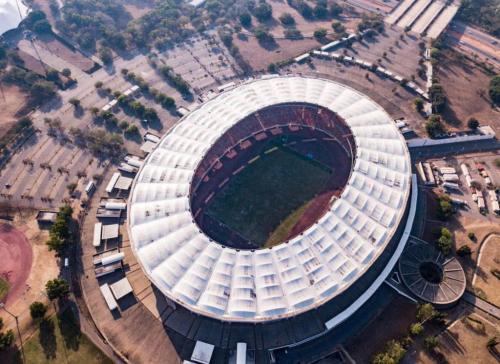MKO Abiola National Stadium: Abuja’s Premier Sports and Events Venue
The MKO Abiola National Stadium in Abuja is more than just a sports venue; it’s a symbol of Nigeria’s dedication to sports and national unity. Named after the influential Nigerian leader Moshood Abiola, the stadium stands as a testament to the country’s rich history and modern aspirations.
Architectural Design and Capacity
Opened in 2003, the stadium showcases a modern design that balances functionality with visual appeal. With a seating capacity of approximately 60,000, it is one of Nigeria’s largest stadiums. Its circular design includes a retractable roof, ensuring comfort and excellent visibility for all spectators.
Key Details
| Stadium | Details |
|---|---|
| Capacity | 60,491 |
| Country | Nigeria |
| City | Abuja |
| Clubs | – |
| Inauguration | April 8, 2003 (Shooting Stars vs. Sunshine Stars, 1-0) |
| Construction | 2000-2003 |
| Cost | NGN 54 billion |
| Design | SBP (Schlaich Bergermann und Partner) |
| Contractor | Julius Berger Nigeria |
| Address | Independence Avenue, Abuja, Nigeria |
Sports Facilities
Football Pitch
The stadium features a top-tier football pitch that meets international standards. The well-maintained grass surface hosts local and international matches, including league games and friendly fixtures.
Athletics Track
Encircling the football field is an eight-lane synthetic athletic track. This track accommodates various events, from sprints to marathons, making it a versatile venue for athletic competitions.
Training Facilities
Equipped with modern training facilities, the stadium offers gyms and locker rooms essential for athletes. These amenities support both individual athletes and teams in their preparation for competitions.
Event Hosting
The MKO Abiola National Stadium is not limited to sports. It serves as a prime location for a variety of events, including:
Concerts
The stadium is a favorite for concerts, featuring performances by both international and local artists. Its large capacity and excellent acoustics make it ideal for live music events.
Cultural and National Events
The stadium hosts national celebrations, cultural festivals, and public rallies. Its versatility allows it to adapt to different events, accommodating large crowds and providing a central location for significant public gatherings.
Community and Youth Programs
The stadium engages the community by hosting youth sports programs, local tournaments, and educational events. These initiatives promote sportsmanship and healthy lifestyles among young Nigerians.
Accessibility and Amenities
Location
Strategically located in Abuja, the stadium is easily accessible from various parts of the city. Its central location ensures convenience for residents and visitors alike.
Parking
The stadium offers extensive parking facilities for thousands of vehicles, ensuring a hassle-free experience for attendees. The well-organized parking areas efficiently manage large crowds during major events.
Facilities
Modern amenities at the stadium include restrooms, food and beverage concessions, and first aid stations. These facilities ensure a comfortable and enjoyable experience for all visitors.
Public Transportation
The stadium is well-connected by public transportation, including buses and taxis, providing easy access for those using public transit.
Future Developments
Committed to continuous improvement, the MKO Abiola National Stadium has plans for future upgrades. These include enhancing facilities, expanding seating capacity, and upgrading infrastructure to maintain its status as a premier venue for sports and entertainment. These developments aim to provide an even better experience for participants and spectators alike.
Get in Touch
Address: Constitution Ave., Kukwaba, Abuja, 900211, Federal Capital Territory
Key Takeaways
- The MKO Abiola National Stadium is a symbol of Nigeria’s sports and cultural heritage.
- With a seating capacity of 60,491, it is one of the largest stadiums in Nigeria.
- The stadium hosts a variety of events, from sports to concerts and cultural festivals.
- It is equipped with modern amenities and training facilities, making it a versatile venue.
- Future developments aim to enhance the stadium’s infrastructure and facilities.
Frequently Asked Questions About MKO Abiola Stadium, Abuja
1. What is the seating capacity of Moshood Abiola National Stadium?
The stadium has a seating capacity of 60,491.
2. Where is Moshood Abiola National Stadium located?
It is located on Independence Avenue in Abuja, Nigeria.
3. When was the stadium inaugurated?
The stadium was inaugurated on April 8, 2003, with a match between Shooting Stars and Sunshine Stars, which ended 1-0.
4. Who designed Moshood Abiola National Stadium?
The stadium was designed by SBP (Schlaich Bergermann und Partner).
5. Which company constructed the stadium?
Julius Berger Nigeria was the contractor responsible for the construction of the stadium.
6. How long did it take to construct the stadium?
The construction of the stadium took place from 2000 to 2003.
7. What was the cost of building Moshood Abiola National Stadium?
The construction cost of the stadium was NGN 54 billion.
8. Are there any clubs based at Moshood Abiola National Stadium?
Currently, there are no clubs based at the stadium.
9. What events can be held at the stadium?
The stadium is versatile and can host a variety of events, including football matches, athletics, concerts, and other large-scale public events.
10. Is the stadium accessible to the public?
Yes, the stadium is accessible to the public for events, tours, and other activities as scheduled.
11. What amenities are available at the stadium?
The stadium features modern amenities, including VIP suites, media facilities, athlete accommodations, and ample parking.
12. How can I get to Moshood Abiola National Stadium?
The stadium is easily accessible by road and public transportation options are available within Abuja.
13. Can the stadium be rented for private events?
Yes, the stadium can be rented for private events, subject to availability and approval by the management.
Conclusion
The MKO Abiola National Stadium in Abuja is a landmark venue that embodies Nigeria’s dedication to sports, culture, and community engagement. With its state-of-the-art facilities and versatile event hosting capabilities, it continues to play a crucial role in the national and cultural landscape of Nigeria.





